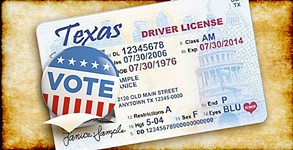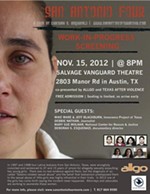'Grooming' on Trial: Science or Supposition?
Is grooming a science? Says who?
By Jordan Smith, 8:44AM, Fri. Jun. 24, 2011
Did the state meet its burden of proof in the trial of a North Texas man accused of indecency with a child – that testimony about the "grooming" of young victims was based on a reliable field of scientific study?
That's the specific question that Texas' Court of Criminal Appeals will have to answer in the case of Daniel Morris, who was convicted of indecency with his teenage stepson. But that question, while narrow, has larger implications about what constitutes science and what makes a person an expert in any given field.
In 2003, Daniel Morris' estranged wife Melissa Jane Olson filed a complaint with the Johnson Co. Sheriff's Office (just South of Fort Worth), complaining that Morris had inappropriately touched her teen son, Jacob. That investigation led to Morris' prosecution for indecency with a child. There was he-said-she-said testimony at trial about whether, and in what context, Jacob and Morris spent time together. Olson's family accused Morris of improperly touching the boy, while Morris and his colleagues and friends countered that the two were close and that any touching was made in the course of roughhousing. During his testimony, Jacob at one point said that the touching had been sexual in nature, but also testified that it was in fact "horseplay," which is what he'd told law enforcement officials who had investigated his mother's complaint. (Jacob also denied telling a friend of Morris' that his biological father had promised to buy him a Jeep if he would agree to testify against Morris; Morris' friend stood by the allegation.)
The state bolstered its case that this had been improper touching by putting on the stand former Texas Ranger David Hullum. Hullum, who had a background in animal science and 29 years of law enforcement experience, was allowed to testify as an expert on "grooming" (and its "methodology") – the practice of "desensitizing" a potential sex abuse victim to touch and actions that become progressively sexual in nature. Hullum had no training in psychology and no specific education on grooming per se; rather, he testified that he'd gathered expertise on-the-job, as an investigator of more than 300 sex offense accusations, a third of which involved children. Notably, Hullum never interviewed Jacob and was not an investigator in the Morris case. Although the defense objected, Hullum was allowed to testify as an expert on the topic – without any judicial vetting as to whether "grooming" is actually an accepted science. Indeed, during his testimony, Hullum testified not only about grooming in general, but opined that that is what Morris was doing with stepson Jacob.
In the end, Morris was found guilty and sentenced to 10 years on probation and fined $10,000.
On appeal, Texas' 11th Court of Appeals acknowledged that the state had the burden to show that Hullum's testimony involved a legitimate "field of expertise." But the court sidestepped the question of whether the trial court had actually done that. Instead, the court ruled that trial court's decision to allow Hullum to testify was a good call, because Hullum's law enforcement training made him an expert.
But now Texas' highest criminal court, the CCA, must decide whether the state ever proved that grooming is a reliable field. During oral arguments on June 16, appellate attorney Terry Kirk argued that there was nothing to suggest grooming is an actual science – and that the state failed in Morris' case to offer any evidence that it is. Typically, the courts have drawn lines between "hard" and "soft" sciences. Hard sciences are quantifiable, whereas soft sciences – like psychology or sociology – are more qualitative. Obviously "grooming" wouldn't be a hard science, but even if it is a soft one, that doesn't mean the state has only to meet "soft standards," Kirk argued.
Isn't it enough that the state has pointed to federal cases where grooming has been demonstrated as a science for the purposes of testimony, asked Presiding Judge Sharon Keller. Those cases may exist, but the state never offered any proof of reliability – even including any federal court cases – to demonstrate that grooming is a reliable science that could be used in this case, Kirk replied. "Those cases were not given to the trial court," he said. "The state argued [only]...'well judge, you've upheld this stuff before.' Just because the trial court has heard evidence before...doesn't mean it is reliable" in this case, he said.
Moreover, Kirk argued that at trial, Hullum could not point to any "learned treatises" or peer-reviewed works by established scientists – psychologists or sociologists – to show that he was basing his testimony on solid scholarship. "It's been a long time since I've taken psychology," he said, "but psychologists write about everything – even more than lawyers." As such, it is difficult to understand why Hullum couldn't recall any specific sources from which he learned about the elements of grooming. But wouldn't Hullum's background in law enforcement imbue him with knowledge that would make his testimony inherently reliable, more than one judge asked. No, said Kirk, because without any information about what methodology Hullum used to arrive at his expertise – for example, how many folks had he interviewed during his career who had been subject to grooming? How many had Hullum thought were victims of grooming, but weren't? – there is no way to determine that his testimony was reliable. "We don't know any of that," he answered.
So "you're saying there is no such thing as 'grooming' that is accepted anywhere" as reliable science, asked Judge Cathy Cochran, the court's evidence law expert. Not in this case, Kirk replied.
But the courts are not required to "reinvent the wheel," by vetting again and again the same science from trial to trial, argued Sarah Adams, the assistant district attorney representing the state. Information about grooming is so widespread, she argued, that the state didn't need to provide any evidence in this particular case that it is an accepted field of study. In fact, she argued, grooming is "not a science" and this was simply testimony about a mode of operation delivered by a witness with extensive experience in his field. The purpose of Hullum's testimony was only "to put all these innocent acts" between Morris and his stepson – including back rubs before bed and conversations about sex – "into context" to show that Morris' behavior was meant to desensitize Jacob before victimizing him. Hullum's testimony was valid "not in a scientific way, just in his experience," Adams said.
Who is an expert and what constitutes science are open questions for the criminal justice system. The CCA last year ruled that a well-known psychiatrist, Dr. Richard Coons, had testified improperly in death penalty cases about the issue of future dangerousness: He may be a licensed psychiatrist – and as such, an acceptable expert – but the methodology behind his in-court opinions about whether certain defendants would pose a continuing threat to society unless sentenced to death were not based on any empirical standard, relying instead on an I-know-it-when-I-see-it approach that the court ruled was unacceptable as a basis for expert evidence. If the court decides that Hullum's testimony is allowed without any showing that the basis of his expertise is reliable, it could create an odd middle ground: Hard sciences must be proven, but softer sciences can fly on experience alone. In the context of sex offender cases – and especially in those involving children, where the guilt reflex can often be quite strong – the worry is that the floodgates to unscientific testimony could be opened wide. "You could have anybody get up [on the witness stand] and testify and as long as they've had any experience with sex offenders" they would be considered an expert in offenders or victimology, says Kirk. "I think it is a danger." Indeed, as in the Morris case, allegations of sexual abuse of children often come up in the context of a dissolving marriage, making the potential harm of unreliable testimony that much more devastating to children and their families.
Also at issue is Hullum's testimony that Morris was indeed guilty of having groomed Jacob for nefarious purposes. Under Texas law, experts are not generally allowed to provide a conclusion about a defendant's guilt. That happened in the Morris case, over objection by the defense. The 11th Court of Appeals ruled that the opinion was improper, but held that it was a "harmless error" – in other words, that it did not affect the outcome of the trial. Although the CCA did not grant Morris' appeal to hear an argument about that point, Kirk hopes that the Court will reconsider their decision and, at least, send the case back to the 11th Court for additional hearing.
There is no timeline for the court to rule.
Got something to say on the subject? Send a letter to the editor.
A note to readers: Bold and uncensored, The Austin Chronicle has been Austin’s independent news source for over 40 years, expressing the community’s political and environmental concerns and supporting its active cultural scene. Now more than ever, we need your support to continue supplying Austin with independent, free press. If real news is important to you, please consider making a donation of $5, $10 or whatever you can afford, to help keep our journalism on stands.
Richard Whittaker, Aug. 25, 2017
Richard Whittaker, July 7, 2016
Jordan Smith, Aug. 6, 2012
May 22, 2014
sex offenders, Terry Kirk, Court of Criminal Appeals, CCA, Sharon Keller, Cathy Cochran, Sarah Adams, Daniel Morris, grooming, courts, cops













